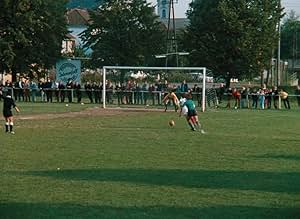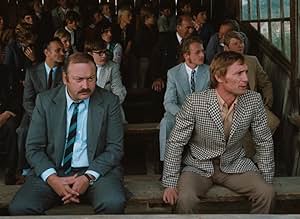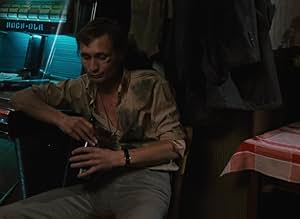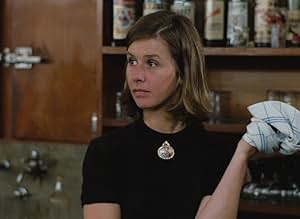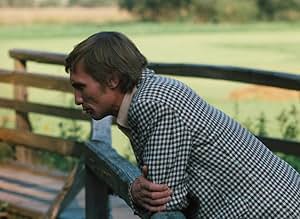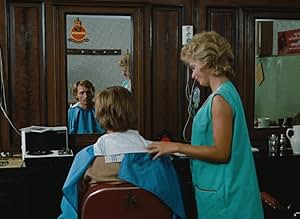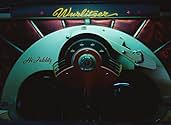Die Angst des Tormanns beim Elfmeter
- 1972
- 1 घं 41 मि
IMDb रेटिंग
6.5/10
2.5 हज़ार
आपकी रेटिंग
अपनी भाषा में प्लॉट जोड़ेंGoalkeeper Josef Bloch is ejected during a game for foul play. He leaves the field and goes to spend the night with a cinema cashier.Goalkeeper Josef Bloch is ejected during a game for foul play. He leaves the field and goes to spend the night with a cinema cashier.Goalkeeper Josef Bloch is ejected during a game for foul play. He leaves the field and goes to spend the night with a cinema cashier.
- पुरस्कार
- कुल 1 जीत
Monika Poeschl
- 1. Frisöse
- (as Monika Pöschl)
फ़ीचर्ड समीक्षाएं
I just want to say that this movie, when I watched it first time long ago, opened the doors of what cinema could say, in which ways, and how it could go as far as possible from a typical theatrical or literary (linear,logical, rational) treatment of its artistic matter; pursuing a more "musical" or "harmonically oriented" approach.
Wenders develops this work as a series of "climates" or ambiances(we're talking "street" climates and ambiances, sometimes ugly or ridiculous; not that silly "grandeur" that spoils so many artworks) that contain valuable, almost satirical remarks on the "cheating" that our expectations and concepts are constantly playing to our minds.
The particular sense of humor and drama of the script writer and the director just hit a string on me; as did the musical score. I only regret that is very difficult to find plays or to purchase any copies, in any format, of this strange gem here in Argentina. I could watch it only twice, in cultural centers at Buenos Aires, which is not my hometown. This is a movie that you can enjoy over and over, as if it were a musical masterpiece. I'd like to point out that I'm not a native English speaker, so I apologize if my writing style is not quite correct.
Wenders develops this work as a series of "climates" or ambiances(we're talking "street" climates and ambiances, sometimes ugly or ridiculous; not that silly "grandeur" that spoils so many artworks) that contain valuable, almost satirical remarks on the "cheating" that our expectations and concepts are constantly playing to our minds.
The particular sense of humor and drama of the script writer and the director just hit a string on me; as did the musical score. I only regret that is very difficult to find plays or to purchase any copies, in any format, of this strange gem here in Argentina. I could watch it only twice, in cultural centers at Buenos Aires, which is not my hometown. This is a movie that you can enjoy over and over, as if it were a musical masterpiece. I'd like to point out that I'm not a native English speaker, so I apologize if my writing style is not quite correct.
This is a detective film, but it's not really a film noir or cop drama like we're used to in the U.S. However, there are lots of references to America's overwhelming cultural presence throughout.
For me, Jurgen Knieper's score serves the story well; the tune still comes back to me all these years later.
It's a simple monotonous tune, the main parts being just two notes that the small chamber group works back and forth. It may not sound like much, but in reality it becomes mesmerizing, almost like a 2nd main character, and something that won't release you, like fate.
The film, of course, is genius.
The understated music matches the film's lack of much excitement or development.
The visuals and music work to produce a profoundly unsettling look at the monotonous life of the murderer.
For me, Jurgen Knieper's score serves the story well; the tune still comes back to me all these years later.
It's a simple monotonous tune, the main parts being just two notes that the small chamber group works back and forth. It may not sound like much, but in reality it becomes mesmerizing, almost like a 2nd main character, and something that won't release you, like fate.
The film, of course, is genius.
The understated music matches the film's lack of much excitement or development.
The visuals and music work to produce a profoundly unsettling look at the monotonous life of the murderer.
Spoiler alert, this is not a film about soccer at all, and there is no drama surrounding a penalty kick. Wim Wender's first film is a rather ponderous foray into the randomness of violence and suffering in the world. The anxiety here, the terror, is in just how senseless it is, as senseless as that goal scored while the goalie is barely paying attention in the opening scene. The anxiety is also in knowing that ordinary people wandering around have that in them, or could have committed such an act in the spur of the moment, and then gone on with their lives.
In addition to a critical point of violence that the film rests upon, we see smaller references, such as the goalie getting beaten up in the street a couple times, a reference to the murder of Sharon Tate, and a story in the papers is that a young boy has gone missing, presumably harmed. We see it in the goalie's case as being completely unplanned, which is shocking in itself, but it's also disconcerting when what follows is not a traditional crime drama, with a detective then trying to track him down. Life simply goes on.
In a minor key, I felt the usual kinds of questions, e.g. Will he do it again, and will he be caught, but those were not the main things causing tension. It was more like, why did he end up doing that to the young woman and not one of the other women he meets while traveling around? Does the world even care, listening to the buoyant music from the 50's and 60's? Is the veneer of civilization so thin that there are other sociopaths we see (in the film or in real life), who have done such things? These are haunting, existential questions. We wish for life to make sense and be fair, but oftentimes it is neither. Those big moments in soccer, or our favorite sports, as much as we get wrapped up in them - they seem trivial by comparison - but even there, we see randomness, the goalie guessing to dive left or right at the penalty kick.
I liked the concept for the film and how it managed such brutal statements about the world in such a low-key way, but I have to say, watching it was not terribly interesting. The dispassionate feeling of the killer and the disconnected events which follow don't make for a compelling story, and the film moves along very slowly. It doesn't escalate and there is little to no transformation, so what we're left with is this dark commentary, which felt as flat as it was depressing. It's worth seeing if you're a Wenders fan, but it's tough to recommend without reservations.
In addition to a critical point of violence that the film rests upon, we see smaller references, such as the goalie getting beaten up in the street a couple times, a reference to the murder of Sharon Tate, and a story in the papers is that a young boy has gone missing, presumably harmed. We see it in the goalie's case as being completely unplanned, which is shocking in itself, but it's also disconcerting when what follows is not a traditional crime drama, with a detective then trying to track him down. Life simply goes on.
In a minor key, I felt the usual kinds of questions, e.g. Will he do it again, and will he be caught, but those were not the main things causing tension. It was more like, why did he end up doing that to the young woman and not one of the other women he meets while traveling around? Does the world even care, listening to the buoyant music from the 50's and 60's? Is the veneer of civilization so thin that there are other sociopaths we see (in the film or in real life), who have done such things? These are haunting, existential questions. We wish for life to make sense and be fair, but oftentimes it is neither. Those big moments in soccer, or our favorite sports, as much as we get wrapped up in them - they seem trivial by comparison - but even there, we see randomness, the goalie guessing to dive left or right at the penalty kick.
I liked the concept for the film and how it managed such brutal statements about the world in such a low-key way, but I have to say, watching it was not terribly interesting. The dispassionate feeling of the killer and the disconnected events which follow don't make for a compelling story, and the film moves along very slowly. It doesn't escalate and there is little to no transformation, so what we're left with is this dark commentary, which felt as flat as it was depressing. It's worth seeing if you're a Wenders fan, but it's tough to recommend without reservations.
The Goalkeeper's Fear of the Penalty is a great title but an odd underwhelming film from Wim Wenders, his cinematic debut.
I only wish it was about a goalkeeper who went all wobbly when about to face a spot kick.
The film does display some of Wender's cinematic tastes. A liking of Americana, being on the road, a character being a person of few words maybe alienated and a languid pace. There is an existentialism about this film.
Joseph Bloch (Arthur Brauss) is a goalkeeper who gets angry when a goal is not called offside. It is a strangely shot sequence as Bloch does not concentrate on the play and makes no attempt to even save the shot. In fact we do not even see the build up to the play.
Bloch gets sent off and as his team was playing away, he makes his way to the city centre where he watches a film. Later he spends a night with the cinema cashier and he than strangles her. Bloch then leaves the city and spends times with an ex girlfriend in the countryside. Bloch constantly reads the newspaper to see what is happening about the murder, there is also a mute boy who has disappeared. Bloch spends time with his ex, listening to American rock n roll and getting involved in bar fights.
If Bloch is upset about the murder we do not get to know about it. The movie is bookended by a football match, at one point Bloch tells a spectator about the various thoughts that go through in a goalkeeper's mind when a penalty is about to be taken.
The lead character is an enigma, he goes about his normal life but he is a killer, maybe he has killed before, maybe he is a fantasist with his interest in American music and carrying US currency. It could just be that Bloch is contemplative about his existence.
In terms of tension, there is not much at all. Bloch gets on with his life, he is never in danger, no one is closing in on him. Critically lauded, age has not been kind to this film. Slow moving and boring.
I only wish it was about a goalkeeper who went all wobbly when about to face a spot kick.
The film does display some of Wender's cinematic tastes. A liking of Americana, being on the road, a character being a person of few words maybe alienated and a languid pace. There is an existentialism about this film.
Joseph Bloch (Arthur Brauss) is a goalkeeper who gets angry when a goal is not called offside. It is a strangely shot sequence as Bloch does not concentrate on the play and makes no attempt to even save the shot. In fact we do not even see the build up to the play.
Bloch gets sent off and as his team was playing away, he makes his way to the city centre where he watches a film. Later he spends a night with the cinema cashier and he than strangles her. Bloch then leaves the city and spends times with an ex girlfriend in the countryside. Bloch constantly reads the newspaper to see what is happening about the murder, there is also a mute boy who has disappeared. Bloch spends time with his ex, listening to American rock n roll and getting involved in bar fights.
If Bloch is upset about the murder we do not get to know about it. The movie is bookended by a football match, at one point Bloch tells a spectator about the various thoughts that go through in a goalkeeper's mind when a penalty is about to be taken.
The lead character is an enigma, he goes about his normal life but he is a killer, maybe he has killed before, maybe he is a fantasist with his interest in American music and carrying US currency. It could just be that Bloch is contemplative about his existence.
In terms of tension, there is not much at all. Bloch gets on with his life, he is never in danger, no one is closing in on him. Critically lauded, age has not been kind to this film. Slow moving and boring.
Huh that Wenders guy really knows how to make a good movie. Who would've thought...
क्या आपको पता है
- ट्रिवियाThe film remained unavailable for three decades for reasons of music rights. (The original soundtrack includes works of Elvis Presley and the Rolling Stones, which is more expensive than the production of the film itself. ) To make the film possible to view again, the director Wim Wenders obtains the right of several songs and replaces other pieces with new songs of lyrics. Those were produced using period instruments and analog techniques from the 1950s to imitate the sound of that time as faithful as possible.
- गूफ़The newspaper article "Heiße Spur im Mordfall Gloria T." (Firm lead in Gloria T. murder case) is actually a newspaper article about a car crash and has nothing whatsoever to do with the movie's plot. It seems that only the headline was changed for the purpose of filming.
- कनेक्शनFeatured in Motion and Emotion: The Films of Wim Wenders (1990)
टॉप पसंद
रेटिंग देने के लिए साइन-इन करें और वैयक्तिकृत सुझावों के लिए वॉचलिस्ट करें
- How long is The Goalie's Anxiety at the Penalty Kick?Alexa द्वारा संचालित
विवरण
- रिलीज़ की तारीख़
- कंट्री ऑफ़ ओरिजिन
- भाषाएं
- इस रूप में भी जाना जाता है
- The Goalie's Anxiety at the Penalty Kick
- फ़िल्माने की जगहें
- उत्पादन कंपनियां
- IMDbPro पर और कंपनी क्रेडिट देखें
बॉक्स ऑफ़िस
- बजट
- DEM 6,20,000(अनुमानित)
इस पेज में योगदान दें
किसी बदलाव का सुझाव दें या अनुपलब्ध कॉन्टेंट जोड़ें

टॉप गैप
By what name was Die Angst des Tormanns beim Elfmeter (1972) officially released in India in English?
जवाब
